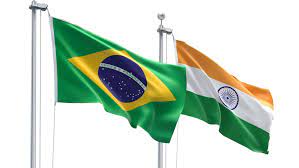
India and Brazil '2+2' talks
India and Brazil '2+2' talks
GS-2: International Relations (IR)
(UPSC/State PSC)
Important for Prelims:
'2+2' dialogue between India and Brazil, BRICS, BASIC, G-20, G-4, IBSA, International Solar Alliance.
Important for Mains:
About ‘2+2’ dialogue, importance of 2+2 dialogue, India-Brazil relations, challenges, Conclusion.
20/03/2024
Why in news:
- Recently, the first '2+2' Defense and Foreign Ministerial talks between India and Brazil were held in New Delhi.
Main points:
- Defence, space, energy, critical minerals, technology, counter-terrorism and other issues of regional, multilateral and mutual interest were discussed in the talks.
- The Brazilian delegation was led by Brazilian Foreign Ministry Director Marcelo Camara and Rear Admiral Fernando de Luca Marques de Oliveira.
- The talks, held on March 14, were co-chaired by an Additional Secretary in the Ministry of External Affairs and a Joint Secretary in the Ministry of Defence.
About ‘2+2’ talks:
- ‘Two Plus Two Dialogue’ is a ministerial level dialogue which is organized between the Foreign Ministry and Defence Ministry of two countries.
- The dialogue provides a platform to review the security, defence and strategic partnership between the two countries through an institutional mechanism at the highest level.
India's 2+2 Dialogue Partners:
- The US has been India's oldest major 2+2 dialogue partner since 2018.
- India's other partner countries on the 2+2 dialogue include Australia, Japan, the United Kingdom and Russia.
Importance of 2+2 talks:
- Having such a mechanism would enable partners to better understand and appreciate each other's strategic concerns and sensitivities while taking into account political factors on both sides to build a stronger, more integrated strategic relationship.
A glimpse of India-Brazil relations:
Diplomatic relations:
- India's diplomatic relations with Brazil were established in 1948 and the two countries have been strategic partners since 2006.
- Both sides also have several joint working groups to advance regional cooperation.
Trade relations:
- India is Brazil's 5th largest trading partner. India and Brazil have established the Trade Monitoring Mechanism as an institutional mechanism to monitor and identify barriers to bilateral trade and take appropriate measures to address them.
- In 2022, bilateral trade is expected to grow by 32% to US$ 15.2 billion (India's exports are US$ 8.8 billion and imports are US$ 6.4 billion).
- Brazil's expertise in biofuels complements India's initiatives, including the Global Biofuels Alliance.
Defence Cooperation:
- India and Brazil signed an agreement in 2003 for cooperation in the defense sector. Joint Defense Committee (JDC) meetings are held as an institutional mechanism for defense cooperation.
Security Cooperation:
- India and Brazil established a Strategic Dialogue Mechanism in 2006 to cover regional and global issues of mutual concern.
- There is an extradition treaty, mutual legal assistance treaty in criminal cases and transfer of convicted persons between the two countries.
- India and Brazil support each other for permanent seats in the UNSC as part of the G4 alliance. They also cooperate in initiatives such as the International Solar Alliance and MERCOSUR.
Space Cooperation:
- India and Brazil signed a Framework Agreement for the Peaceful Uses of Outer Space in 2004 as well as an agreement for inter-institutional cooperation between space agencies.
- Both countries are cooperating in data sharing and satellite tracking of Indian satellites.
- In 2021, ISRO launched the Brazilian satellite Amazonia-1.
Multiphora Relationship:
- India and Brazil share multifaceted relations at the bilateral level as well as through multilateral fora such as BRICS, BASIC, G-20, G-4, IBSA, International Solar Alliance as well as through the United Nations, WTO, UNESCO and WIPO.
Cultural Relations:
- Brazil is interested in India's culture, religion, art and philosophy. Bharatanatyam, Odissi, Kathak and Kuchipudi dances are very popular in Brazil. There are many spiritual organizations in Brazil like Ramakrishna Mission, ISKCON, Bhakti Vedanta Foundation which teach yoga. The first International Yoga Day was organized in 2015 in 12 major cities of Brazil.
Challenges in India-Brazil relations:
Geopolitical Competition:
- Both India and Brazil are emerging powers with aspirations for greater global influence. This can sometimes lead to competition, especially in international forums such as the United Nations, where both countries seek greater representation and influence.
Trade Barriers:
- Trade between India and Brazil has not reached its full potential, partly due to various trade barriers and protectionist measures in both countries. These barriers hinder the growth of bilateral trade and investment.
Infrastructure and Connectivity:
- Improving infrastructure and connectivity between the two countries remains a challenge.
- Better air and sea connectivity as well as better transport links are essential to promote trade and people-to-people contacts.
Conclusion:
This dialogue indicates a promising growth in India-Brazil trade relations. To address the current challenges, India should focus primarily on exploring new trade opportunities and strengthening bilateral engagement through global values.
Source: Indian Express
------------------------------------
Mains Question:
There is a strong possibility of deepening multi-dimensional relations between both countries through the India and Brazil ‘2+2’ talks. Discuss.